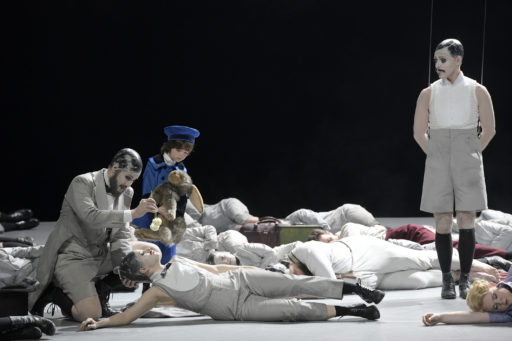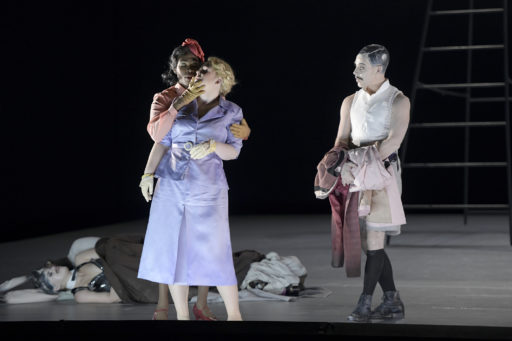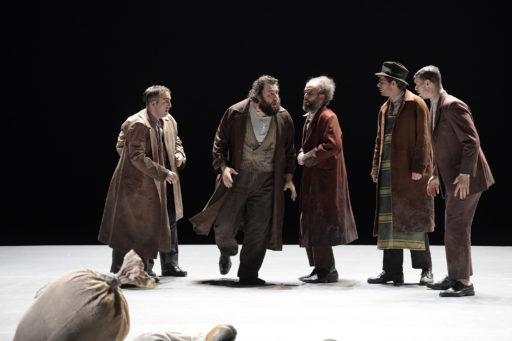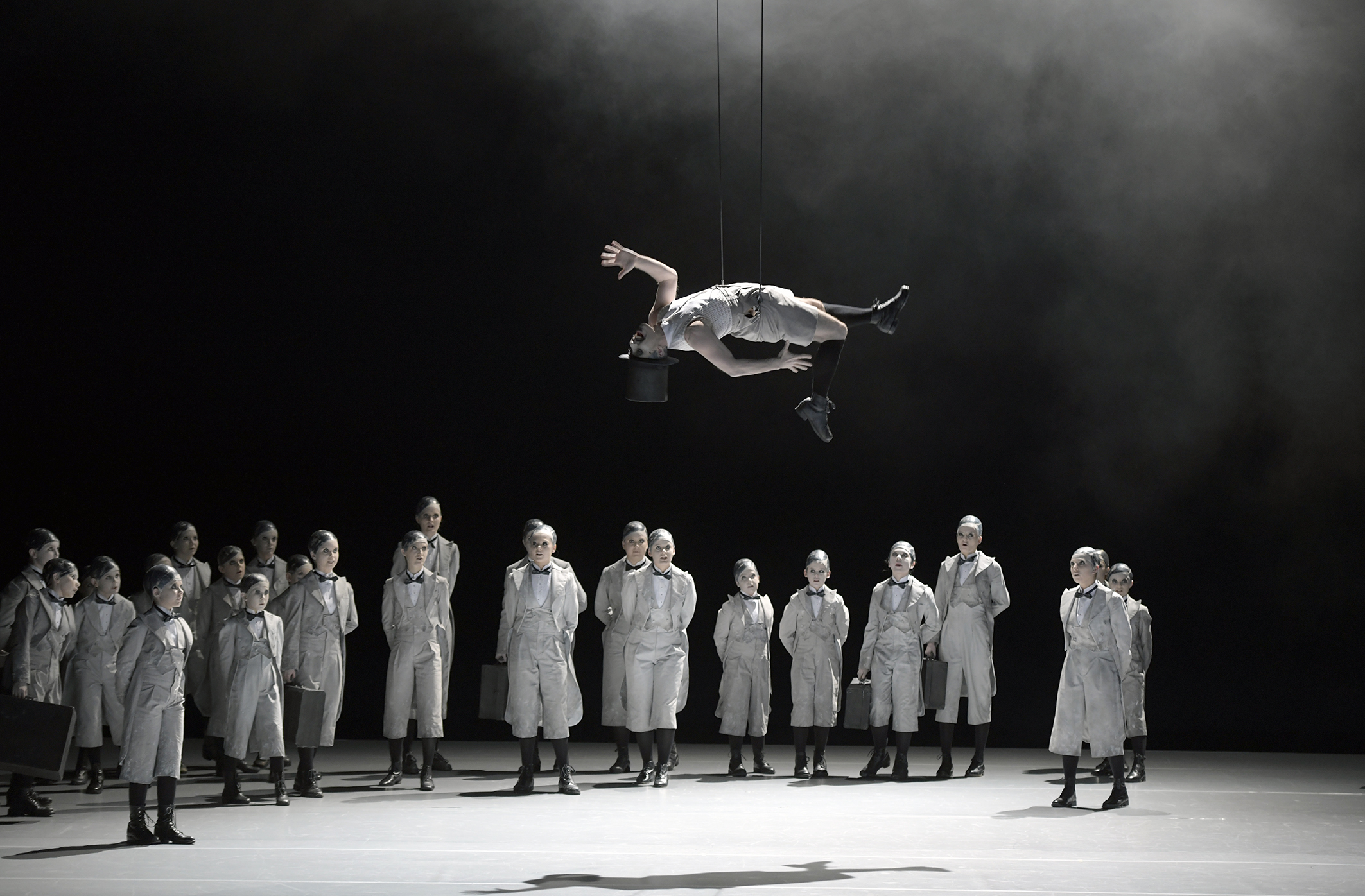Berlin, Deutsche Oper, season 2019/20
“A MIDSUMMER NIGHT’S DREAM”
Opera in three acts, Libretto by Benjamin Britten and Peter Pears after William Shakespeare’s comedy A Midsummer Night’s Dream. Music by Benjamin Britten
Oberon JAMES HALL
Tytania SIOBHAN STAGG
Puck JAMI REID-ELL
Theseus PADRAIC ROWAN
Hyppolyta ANNIKA SCHLICHT
Lysander GIDEON POPPE
Demetrius SAMUEL DALE JOHNSON
Hermia KARIS TUCKER
Helena JEANINE DE BIQUE
Bottom JAMES PLATT
Qiunce TIMOTHY NEWTON
Flute MICHAEL KIM
Snug PATRICK GUETTI
Snout MATTHEW PEÑA
Starveling MATTHEW COSSACK
Cobweb MARKUS KINCH
Peaseblossom LOLA VIOLETTA HABERSTOCK
Mustardseed SELINA ISI
Moth CHIARA ANNABELLE FELDMAN
Kinderchor der Deutschen Oper Berlin
Orchester der Deutschen Oper Berlin
Conductor Donald Runnicles
Children’s chorus Christian Lindhorst
Production Ted Huffman
Stage Marsha Ginsberg
Costumes Annemarie Woods
Light D. M. Wood
Choreography Sam Pinkleton
Choreography (Puck) Ran Arthur Braun
Dramatic adviser Sebastian Hanusa
Berlin, 26th January 2020
A Midsummer Night’s Dream by William Shakespeare has been a theatrical success for centuries and it inspired a lot of artists, choreographers, film-makers and composers such as Henry Purcell, Carl Maria von Weber and Felix Mendelssohn Bartholdy. Music seems ubiquitous in Shakespeare’s comedy when elves dance in a magic wood in midsummer to sing the fairy queen Titania to sleep. Music accompanies the wedding ceremony of the royal couple Theseus and Hippolyta as well as the ribald and funny play Pyramus and Thisbe performed by six ”rude mechanicals”, as they are described by the mischievous sprite Robin ”Puck”. But it took more than 360 years that Benjamin Britten created his operatic version of Shakespeare’s play which was premiered at the Aldeburgh Festival in 1960. A charming and poetic piece in fact, it has never become a great hit of the composer’s oeuvre, probably out of different reasons. Walter Felsenstein staged it in German at the Komische Oper Berlin as early as in 1961.  A friend of mine who saw the legendary production in the 1960s, is still sold on it for its romantic naturalism, theatrical effects and the elaborate and subtle Personenregie. The Deutsche Oper Berlin continues its cycle of Britten operas with A Midsummer Night’s Dream long wished for by musical director Donald Runnicles and directed by Ted Huffman who is raving on its web page about the small coastal resort Provincetown on Cape Cod, MA. It reminds him of the wood in Shakespeare’s play, an oasis of the fairy couple Oberon-Tytania and for the human lovers, just as Provincetown is a harbour for queer people. Benjamin Britten and his partner, the tenor Sir Peter Pears also created an oasis for themselves, far away from the hustle and bustle of London. But there is no romantic naturalism à la Felsenstein, neither an oasis nor a wood in Huffman’s production. Perhaps Marsha Ginsberg (stage) had a say who seems to find it coherent to put nothing on the huge grey stage but a few props such as a high step-ladder, two pink clouds and a yellow crescent: nothing is simply nothing! Bright red dominates the final wedding of the drunkard Theseus and the bored vamp Hyppolyta who looks like Hitler’s wife Eva Braun in her quite as red costume (by Annemarie Woods). The performance of the six rustics is assisted by two big rod puppets as Pyramus and Thisbe, which adds some opulence to the rather boring and dull production. The excellent Kinderchor der Deutschen Oper Berlin trained by Christian Lindhorst is a grey mass in British school uniforms also worn by Oberon, the moustached Tytania, and the Freddie Mercury-like Puck of the actor and performer Jami Reid-Quarrell who dominates the scene with his masterly rope acrobatics choreographed by Ran Arthur Braun. Donald Runnicles is completely at home conducting the Orchester der Deutschen Oper Berlin. He starts with fine portamenti from the strings to carve out lucid glissandi characterizing the fairy world as well as the special texture of harp, celeste and harpsichord, and the particular sequence of four chords in different instruments repeated in the score in passacaglia style.
A friend of mine who saw the legendary production in the 1960s, is still sold on it for its romantic naturalism, theatrical effects and the elaborate and subtle Personenregie. The Deutsche Oper Berlin continues its cycle of Britten operas with A Midsummer Night’s Dream long wished for by musical director Donald Runnicles and directed by Ted Huffman who is raving on its web page about the small coastal resort Provincetown on Cape Cod, MA. It reminds him of the wood in Shakespeare’s play, an oasis of the fairy couple Oberon-Tytania and for the human lovers, just as Provincetown is a harbour for queer people. Benjamin Britten and his partner, the tenor Sir Peter Pears also created an oasis for themselves, far away from the hustle and bustle of London. But there is no romantic naturalism à la Felsenstein, neither an oasis nor a wood in Huffman’s production. Perhaps Marsha Ginsberg (stage) had a say who seems to find it coherent to put nothing on the huge grey stage but a few props such as a high step-ladder, two pink clouds and a yellow crescent: nothing is simply nothing! Bright red dominates the final wedding of the drunkard Theseus and the bored vamp Hyppolyta who looks like Hitler’s wife Eva Braun in her quite as red costume (by Annemarie Woods). The performance of the six rustics is assisted by two big rod puppets as Pyramus and Thisbe, which adds some opulence to the rather boring and dull production. The excellent Kinderchor der Deutschen Oper Berlin trained by Christian Lindhorst is a grey mass in British school uniforms also worn by Oberon, the moustached Tytania, and the Freddie Mercury-like Puck of the actor and performer Jami Reid-Quarrell who dominates the scene with his masterly rope acrobatics choreographed by Ran Arthur Braun. Donald Runnicles is completely at home conducting the Orchester der Deutschen Oper Berlin. He starts with fine portamenti from the strings to carve out lucid glissandi characterizing the fairy world as well as the special texture of harp, celeste and harpsichord, and the particular sequence of four chords in different instruments repeated in the score in passacaglia style.  But he cannot always prevent the orchestra from drowning the singers, which becomes strikingly obvious with James Hall as Oberon whose countertenor is just not big enough for the second biggest opera house in Germany. What adds to the problem is Siobhan Stagg who steals the show from him as Tytania by showing off her brilliant soprano even in the coloratura which is fiendishly hard to sing. There is no doubt that the tenor Gideon Poppe (Lysander) and the baritone Samuel Dale Johnson (Demetrius) are fine singers but their lovers outdo them vocally as well. Karis Tucker (Hermia) has a powerful mezzo and the exotic soprano of Jeanine De Bique (Helena) from Trinidad and Tobago sounds like a mix of Grace Bumbry and Reri Grist. I am looking forward to hearing them in future parts. Annika Schlicht is a convincing Hippolyta while Padraic Rowan as Theseus is not quite up to her standard. James Platt sings and plays a striking Bottom who next to the acrobatic Jami Reid-Quarrell, probably received most applause at the end. The other rustics are cast reliably with Timothy Newton (Qiunce), Michael Kim (Flute), Patrick Guetti (Snug), Mattew Peña (Snout) and Matthew Cossack (Starveling), most of whom are scholars. Astonishingly, the production team was also highly acclaimed.
But he cannot always prevent the orchestra from drowning the singers, which becomes strikingly obvious with James Hall as Oberon whose countertenor is just not big enough for the second biggest opera house in Germany. What adds to the problem is Siobhan Stagg who steals the show from him as Tytania by showing off her brilliant soprano even in the coloratura which is fiendishly hard to sing. There is no doubt that the tenor Gideon Poppe (Lysander) and the baritone Samuel Dale Johnson (Demetrius) are fine singers but their lovers outdo them vocally as well. Karis Tucker (Hermia) has a powerful mezzo and the exotic soprano of Jeanine De Bique (Helena) from Trinidad and Tobago sounds like a mix of Grace Bumbry and Reri Grist. I am looking forward to hearing them in future parts. Annika Schlicht is a convincing Hippolyta while Padraic Rowan as Theseus is not quite up to her standard. James Platt sings and plays a striking Bottom who next to the acrobatic Jami Reid-Quarrell, probably received most applause at the end. The other rustics are cast reliably with Timothy Newton (Qiunce), Michael Kim (Flute), Patrick Guetti (Snug), Mattew Peña (Snout) and Matthew Cossack (Starveling), most of whom are scholars. Astonishingly, the production team was also highly acclaimed.
A Midsummer Night’s Dream von William Shakespeare ist seit Jahrhunderten ein Erfolgsstück und hat viele Künstler, Choreografen, Filmemacher und Komponisten wie Henry Purcell, Carl Maria von Weber and Felix Mendelssohn Bartholdy inspiriert. Musik scheint in Shakespeares Komödie allgegenwärtig, wenn Elfen in einem sommerlichen Zauberwald tanzen und die Feenkönigin Titania in den Schlaf singen. Musik begleitet die Hochzeit des Königspaares Theseus und Hippolyta ebenso wie das von sechs Handwerkern – vom schelmischen Kobold Robin „Puck” auch als „rude mechanicals” bezeichnet – aufgeführte derb-lustige Spiel Pyramus und Thisbe. Es sollte jedoch mehr als 360 Jahre dauern, bis Benjamin Britten seine Opernversion des Shakespeare-Stoffes schuf, die 1960 beim Aldeburgh Festival uraufgeführt wurde. Eigentlich ein gefälliges und poetisches Werk, ist es nie ein großer Erfolg im Oeuvre des Komponisten geworden, wahrscheinlich aus verschiedenen Gründen. Walter Felsenstein hat es bereits 1961 an der Komischen Oper Berlin herausgebracht. Ein Freund von mir, der die Inszenierung in den 1960ern sah, schwärmt immer noch begeistert von ihrem romantischen Naturalismus, den Theatereffekten und der ausgeklügelten und detailgenauen Personenregie. Nun setzt die Deutsche Oper Berlin ihren Britten-Opernzyklus mit A Midsummer Night’s Dream fort, seit langem ein Wunsch von Generalmusikdirektor Donald Runnicles und inszeniert von Ted Huffman, der auf der Website des Hauses vom kleinen Seebad Provincetown auf Cape Cod in Massachusetts schwärmt. Es erinnere ihn an den Wald des Shakespeare-Stücks, eine Oase des Feenpaares Oberon-Tytania und für die menschlichen Liebespaare, so wie Provincetown ein Zufluchtsort für queere Leute ist. Auch Benjamin Britten und sein Partner, der Tenor Sir Peter Pears, schufen sich so eine Oase, fernab des Trubels von London. Aber es gibt keinen romantischen Naturalismus, weder eine Oase noch einen Wald in Huffmans Inszenierung. Vielleicht hatte Bühnenbildnerin Marsha Ginsberg ein Mitspracherecht, die es logisch zu finden scheint, nichts auf die riesige graue Bühne zu stellen, bis auf ein paar Requisiten wie eine hohe Stehleiter, zwei rosafarbene Wolken und einen gelben Halbmond: nichts ist einfach nichts! Knallrot kommt am Ende die Hochzeit des Tunkenboldes Theseus und des gelangweilten Vamps Hyppolyta daher, die in ihrem ebenso roten Kostüm (von Annemarie Woods) wie Eva Braun aussieht. Die Aufführung der sechs Handwerker wird von zwei großen Stabpuppen als Pyramus und Thisbe unterstützt, was einige Opulenz in die eher langweilige und düstere Inszenierung bringt. Der ausgezeichnete Kinderchor der Deutschen Oper Berlin, einstudiert von Christian Lindhorst, ist eine graue Masse in britischen Schuluniformen, wie sie auch von Oberon, der schnauzbärtigen Tytania, und dem Freddie Mercury-ähnlichen Puck des Schauspielers und Körperkünstlers Jami Reid-Quarrell, der die Bühne mit seiner meisterhaften Seilakrobatik dominiert, choreografiert von Ran Arthur Braun. Donald Runnicles ist mit seinem Dirigat des Orchesters der Deutschen Oper Berlin ganz in seinem Element. Er beginnt mit zarten Portamenti aus den Streichern und arbeitet leuchtende, die Feenwelt charakterisierende Glissandi heraus, wie auch das besondere Gefüge von Harfe, Celesta und Cembalo und die spezielle Abfolge von vier Akkorden in verschiedenen Instrumentengruppen, die in der Partitur im Form der Passacaglia wiederholt wird. Dennoch kann er nicht immer verhindern, dass die Sänger vom Orchester übertönt werden, was insbesondere bei James Hall als Oberon eklatant deutlich wird, dessen Countertenor einfach nicht groß genug für das zweitgrößte Opernhaus Deutschlands ist. Hinzu kommt, dass Siobhan Stagg ihm als Tytania den Rang abläuft und ihren brillianten Sopran selbst in den vertracktesten Koloraturen herausstellt. Zweifellos sind der Tenor Gideon Poppe (Lysander) und der Bariton Samuel Dale Johnson (Demetrius) ausgezeichnete Sänger, aber ihre Geliebten übertreffen sie stimmlich ebenfalls. Karis Tucker (Hermia) besitzt einen profunden Mezzo und der exotische Sopran von Jeanine De Bique (Helena) aus Trinidad und Tobago klingt wie eine Mischung aus Grace Bumbry and Reri Grist. Ich bin gespannt, beide in zukünftigen Partien zu hören. Annika Schlicht ist eine überzeugende Hippolyta, während Padraic Rowan als Theseus nicht ganz an sie heranreicht. James Platt singt und spielt einen eindrucksvollen Bottom, der neben dem akrobatischen Jami Reid-Quarrell wahrscheinlich den meisten Schlussapplaus bekam. Die anderen Handwerker sind zuverlässig mit Timothy Newton (Qiunce), Michael Kim (Flute), Patrick Guetti (Snug), Mattew Peña (Snout) und Matthew Cossack (Starveling) besetzt, von denen die meisten Stipendiaten sind. Erstaunlicherweise bekam das Produktionsteam viel ungeteilten Beifall.
Eigentlich ein gefälliges und poetisches Werk, ist es nie ein großer Erfolg im Oeuvre des Komponisten geworden, wahrscheinlich aus verschiedenen Gründen. Walter Felsenstein hat es bereits 1961 an der Komischen Oper Berlin herausgebracht. Ein Freund von mir, der die Inszenierung in den 1960ern sah, schwärmt immer noch begeistert von ihrem romantischen Naturalismus, den Theatereffekten und der ausgeklügelten und detailgenauen Personenregie. Nun setzt die Deutsche Oper Berlin ihren Britten-Opernzyklus mit A Midsummer Night’s Dream fort, seit langem ein Wunsch von Generalmusikdirektor Donald Runnicles und inszeniert von Ted Huffman, der auf der Website des Hauses vom kleinen Seebad Provincetown auf Cape Cod in Massachusetts schwärmt. Es erinnere ihn an den Wald des Shakespeare-Stücks, eine Oase des Feenpaares Oberon-Tytania und für die menschlichen Liebespaare, so wie Provincetown ein Zufluchtsort für queere Leute ist. Auch Benjamin Britten und sein Partner, der Tenor Sir Peter Pears, schufen sich so eine Oase, fernab des Trubels von London. Aber es gibt keinen romantischen Naturalismus, weder eine Oase noch einen Wald in Huffmans Inszenierung. Vielleicht hatte Bühnenbildnerin Marsha Ginsberg ein Mitspracherecht, die es logisch zu finden scheint, nichts auf die riesige graue Bühne zu stellen, bis auf ein paar Requisiten wie eine hohe Stehleiter, zwei rosafarbene Wolken und einen gelben Halbmond: nichts ist einfach nichts! Knallrot kommt am Ende die Hochzeit des Tunkenboldes Theseus und des gelangweilten Vamps Hyppolyta daher, die in ihrem ebenso roten Kostüm (von Annemarie Woods) wie Eva Braun aussieht. Die Aufführung der sechs Handwerker wird von zwei großen Stabpuppen als Pyramus und Thisbe unterstützt, was einige Opulenz in die eher langweilige und düstere Inszenierung bringt. Der ausgezeichnete Kinderchor der Deutschen Oper Berlin, einstudiert von Christian Lindhorst, ist eine graue Masse in britischen Schuluniformen, wie sie auch von Oberon, der schnauzbärtigen Tytania, und dem Freddie Mercury-ähnlichen Puck des Schauspielers und Körperkünstlers Jami Reid-Quarrell, der die Bühne mit seiner meisterhaften Seilakrobatik dominiert, choreografiert von Ran Arthur Braun. Donald Runnicles ist mit seinem Dirigat des Orchesters der Deutschen Oper Berlin ganz in seinem Element. Er beginnt mit zarten Portamenti aus den Streichern und arbeitet leuchtende, die Feenwelt charakterisierende Glissandi heraus, wie auch das besondere Gefüge von Harfe, Celesta und Cembalo und die spezielle Abfolge von vier Akkorden in verschiedenen Instrumentengruppen, die in der Partitur im Form der Passacaglia wiederholt wird. Dennoch kann er nicht immer verhindern, dass die Sänger vom Orchester übertönt werden, was insbesondere bei James Hall als Oberon eklatant deutlich wird, dessen Countertenor einfach nicht groß genug für das zweitgrößte Opernhaus Deutschlands ist. Hinzu kommt, dass Siobhan Stagg ihm als Tytania den Rang abläuft und ihren brillianten Sopran selbst in den vertracktesten Koloraturen herausstellt. Zweifellos sind der Tenor Gideon Poppe (Lysander) und der Bariton Samuel Dale Johnson (Demetrius) ausgezeichnete Sänger, aber ihre Geliebten übertreffen sie stimmlich ebenfalls. Karis Tucker (Hermia) besitzt einen profunden Mezzo und der exotische Sopran von Jeanine De Bique (Helena) aus Trinidad und Tobago klingt wie eine Mischung aus Grace Bumbry and Reri Grist. Ich bin gespannt, beide in zukünftigen Partien zu hören. Annika Schlicht ist eine überzeugende Hippolyta, während Padraic Rowan als Theseus nicht ganz an sie heranreicht. James Platt singt und spielt einen eindrucksvollen Bottom, der neben dem akrobatischen Jami Reid-Quarrell wahrscheinlich den meisten Schlussapplaus bekam. Die anderen Handwerker sind zuverlässig mit Timothy Newton (Qiunce), Michael Kim (Flute), Patrick Guetti (Snug), Mattew Peña (Snout) und Matthew Cossack (Starveling) besetzt, von denen die meisten Stipendiaten sind. Erstaunlicherweise bekam das Produktionsteam viel ungeteilten Beifall.
